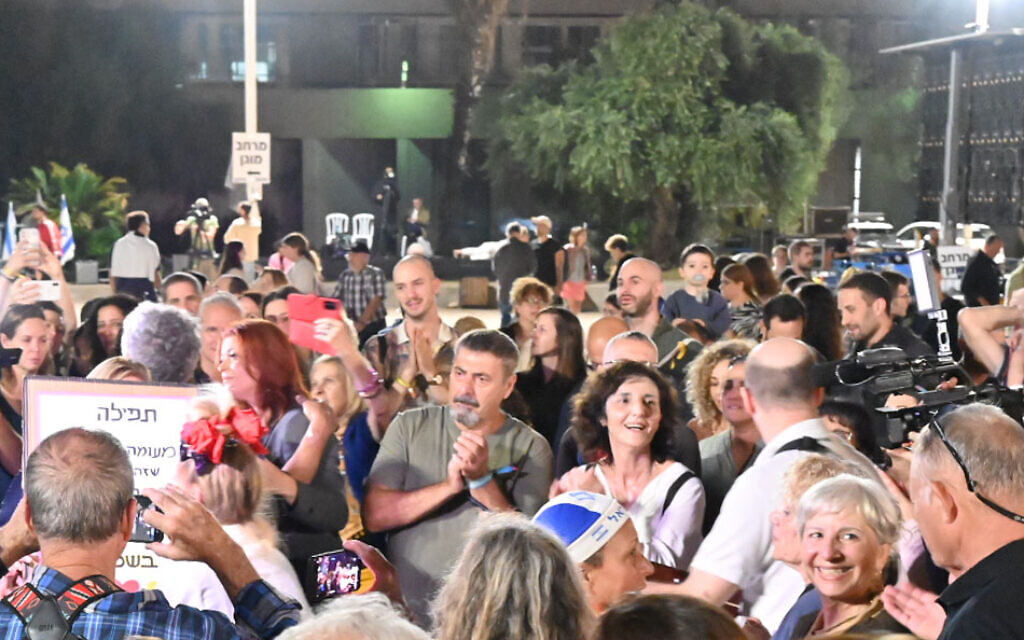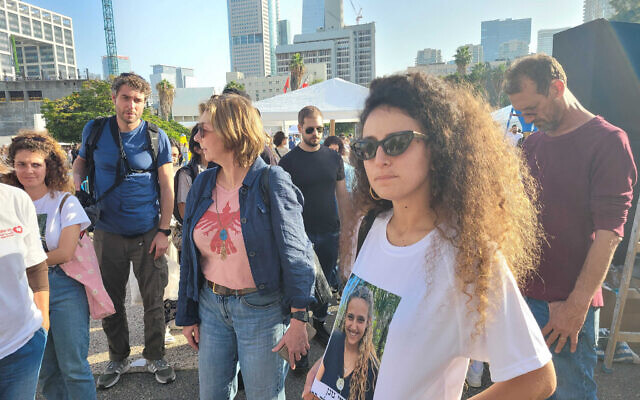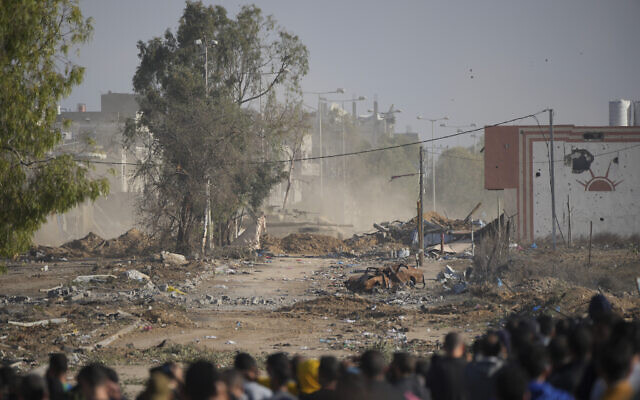



News of the safe return from Gaza of 13 Israelis on Friday rippled visibly through the crowd in Tel Aviv’s so-called Hostages Square.
Gradually, after enough people had double-checked the news on their mobile phones, expressions of quiet happiness began manifesting. It was an unusual sentiment at the square that has become a hub of activism for the release of some 240 hostages abducted by Hamas on October 7.
As the sun set on Tel Aviv, the weekly Shabbat ceremony at the square slowly picked up and, for the first time since the site’s transformation last month, people began singing, dancing and clapping.
The change underscored Israelis’ deep need to see the release of their countrymen held in Gaza, even if it means trading with a reviled enemy that has never been more intensely hated here.
Dance circles began to form and smiling strangers threw their arms around one another’s shoulders to form human chains swaying to the rhythm of traditional Friday prayers such as “Oseh Shalom.” They also celebrated with canonic pop songs like “Walking Against the Wind,” a number on defiance and a light at the end of the tunnel written by local rock legend Shalom Hanoch.
“Today, I’m permitting myself cautious optimism,” said Yarden Gonen. Her sister, Romi, is held by Hamas and is not among the 13 who returned. Gonen, a 30-year-old hospital nurse, calls this square “my new home.” She is one of several relatives of hostages who spend a lot of time at the square, giving interviews to the media and leading lobbying efforts for the release of the hostages.
Family members of the hostages have their own private tent at Hostages Square that is off-limits for journalists and other visitors.
Much of the square is devoted to art displays, including a giant chess board where the pieces are wearing blindfolds. Two other displays include cages with dolls of babies inside them. On the square’s edges, teams of activists led multiple activities. One stall was a tefillin stand helmed by Chabad-Lubavitch rabbis. Another was a meditation circle, where some 20 adults stood remarkably still with their eyes closed for long minutes just before the hostages’ release process began a little after 4 p.m.
Friday’s release of hostages was the first in a series of releases expected in the coming days, as part of the agreed-upon deal that will see at least 50 Israelis return, with Jerusalem freeing 150 Palestinian women and minors jailed for terror-related offenses, amid a temporary truce in Gaza.
One of those who returned Friday is Yaffa Adar, an 85-year-old grandmother of eight from Kibbutz Nir Oz. Footage of her stoic behavior during her abduction has turned Adar into an unlikely national hero. Other returnees include Doron Katz-Asher and her daughters Raz, 5, and Aviv, 2, also from Nir Oz, where Hamas terrorists killed more than 100 people — a quarter of the total population.
Thousands of Hamas terrorists murdered some 1,200 Israelis on October 7 and kidnapped hundreds of others, in a shocking onslaught that prompted Israel to vow to topple Hamas’s regime. Israel has conducted war against Hamas in Gaza since then, in a campaign the terror group says has killed over 15,000 — figures that cannot be independently verified.
The lull in the fighting gave some visitors a long-anticipated opportunity to visit the square safely. The threat of rockets during the war had kept Sue Newman, a grandmother of 10 from Rishon Lezion, from visiting sooner, she told The Times of Israel.
Newman said she’s elated about the release of the 13 hostages. But she’s also got issues with accommodating the demands of Hamas and suspending the effort to destroy it.
“I would have stuck to ‘everyone or nothing.’ I would have carried on the war until the last one’s home,” said Newman, a London-born teacher of business English. But this, she added, “takes nothing away from the relief I feel for every person freed.” Still, she added, “you can’t negotiate with a terrorist organization, you can’t be kind to ISIS. They only know to slaughter.”
Gonen said the outcome of Israel’s war on Hamas should be secondary to retrieving the hostages. “I don’t care about anything else. Nothing else matters. Nothing else should matter,” she said. In the background, visitors studied an art display comprising scales in which hostages outweigh the whole of Earth.
Some parents of hostages dispute the long-term effectiveness of trading with Hamas. Most of the families are operating under the Hostages and Missing Families Forum. But Tikvah Forum is an alternative group made up of relatives of hostages who are critical of trading with Hamas.
“The most correct and effective way of retrieving the hostages is by applying uncompromising pressure on Hamas, until the hostages become a liability for it instead of an asset,” a spokesperson for Tikvah told The Times of Israel.
The Forum’s founder is Eliyahu Libman, who heads the municipality of the West Bank settlement of Kiryat Arba near Hebron and whose son Elyakim is believed to be a hostage. So is the son of Zvikah Mor, another Tikvah member. “Our eagerness to receive the hostages raises their price,” he told Channel 14.
Prime Minister Benjamin Netanyahu brought the controversial deal to a cabinet vote, where it passed on Wednesday despite opposition from hardliners in his cabinet, including National Security Minister Itamar Ben Gvir.
Netanyahu said the deal affords a chance to “save babies and mothers with knives at their throats.”
Benny Gantz, an opposition leader who joined Netanyahu’s emergency cabinet after October 7 and who is among the leaders of the war effort, delivered a speech at the square Friday in which he reiterated the government’s message that it intends to resume the intense campaign against Hamas at the end of the lull.
Jimmy Miller, the 47-year-old cousin of hostage Shiri Bibas, does not know whether she and her children will be among the 50 Israelis who are returned under the deal. But even the release of 13 other hostages on Friday provided the happiest day for him in a long time for him, he told The Times of Israel.
It “fills our hearts with joy that we haven’t felt since this started,” Miller said.
Shiri Bibas’s abduction has also become notorious. Videos of her capture disseminated online showed terrorists leading a terrified Bibas around in Kibbutz Nir Oz as she held her two ginger-haired sons to her. The boys’ father Yarden was wounded during the assault and is also thought to be a hostage.
Miller, who has four children himself, had mixed feelings about the exchange deal. “I’m not happy about it but I think we have no other alternatives, we’ve tried for 30 days and we’ve been able to retrieve only one soldier,” he said. “There is no other way to get this done.”








